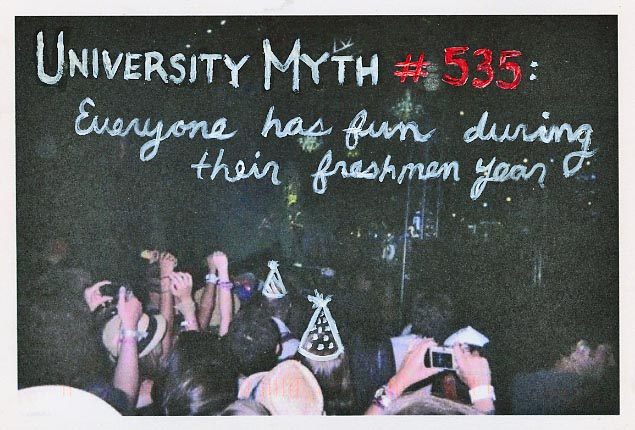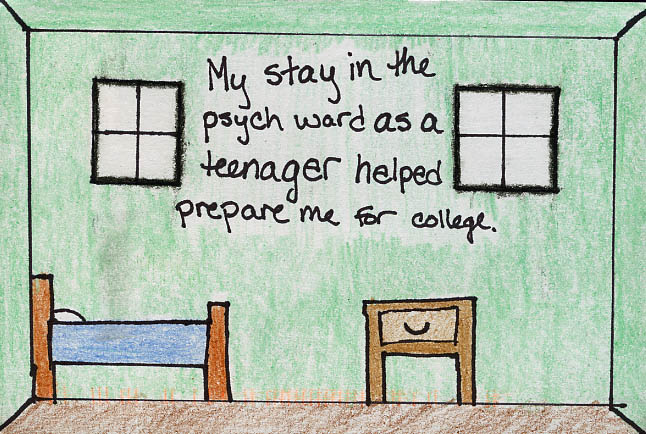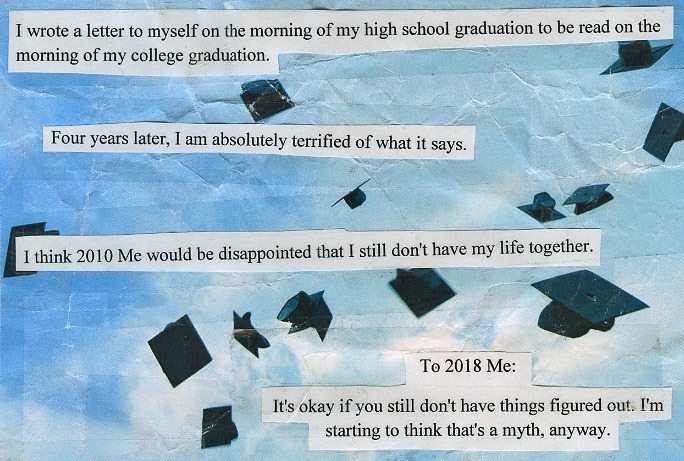
Favorite Post Secrets / Pinterest
When I was a college sophomore, someone placed a tray of index cards, tape, and pens on top of the toilet paper dispenser in one of my dorm’s bathroom stalls. “Spill your secrets,” urged the first index card to be taped to the stall door. The secrets appeared steadily, and soon I would visit that bathroom just to read the newest confessions:
- I’m afraid to come out.
- I miss my mom.
- I’ve never been kissed.
The idea, I’m sure, was borrowed from the PostSecret blog, to which people across the globe submit their deepest, darkest secrets by mail every week. But this “wall of secrets” struck closer to home because it was literally inside the dorm building I called home. That meant that the people shedding secrets were people I knew or knew of. Some were probably written by close friends.
I taped only one secret to the bathroom stall that year: I think I chose the wrong school, so I’m applying to transfer.
It was true. I didn’t have much guidance when I was applying to college in high school. Instead of making college visits to find my match and dream schools, I googled something along the lines of “good schools with good English programs” and called it a day. Once I had a handful of acceptances from the colleges on my list, I chose the one that would take me furthest away from my hometown. That I ended up where I did was haphazard, not intentional. It wasn’t a perfect fit, and that worried me.

Edu In Review
What I liked:
- My small core group of friends
- Beautiful campus with many extracurricular activities
- Commitment to meeting 100% of financial need
- Challenging upper-level classes and few general education requirements
What I disliked:
- Hard to branch out to new friend groups
- Few opportunities to leave campus
- Feeling isolated from the nearest city
- Social scene revolving around parties
I felt like I’d given the school the ol’ college try—excuse the pun—but it was already my second year, and it still didn’t seem like the perfect fit for me. I submitted a transfer application to St. Louis University-Madrid, and I didn’t tell anyone except for the “wall of secrets.”
I was surprised to receive a few responses to my secret. When I went back to that bathroom, two different index cards were stuck to mine.
The first I don’t remember verbatim, but it was a long-winded defense of our school, noting that there were a lot of great people and opportunities, but sometimes it took a little while to find the ones that worked for you. The other response quite simply said, “Me too, but I think I’ll stick around. Where are you going to go?” I appreciated the solidarity.
Even as I was accepted by my transfer school, I had doubts. What if it wasn’t the perfect fit either? What if it was an even worse fit than my first school? There was a certain amount of risk associated with a transfer, and I decided that my situation wasn’t extreme enough to warrant exposure to that risk.

Tumblr
Instead, I wondered how I could make the most of the school I already attended. Surely there were ways I could get off campus more and ways I could try to make more friends. Maybe I was blaming the school for something that I had some control over. The answer seemed pretty clear: I would spend my junior year abroad. It would take me off campus, and I’d meet new people, including some from my home school, without having to transfer. When I came back to school, I’d only have one year left. Voilà! A solution that didn’t involve a school transfer.
In the end, I am so glad I stayed.
So, here’s my advice.
For students who are wondering if they picked the wrong school:

Secret Travel / Campus Riot
It’s possible that another school would have been a better fit, but maybe not. It’s actually pretty normal to have doubts, especially at the very beginning before you’re fully adjusted to campus life. Don’t jump to conclusions; give yourself some time to get used to college, then reevaluate.
If you are still homesick, bored, overwhelmed, lonely, grappling with a long-distance relationship, or not taking care of your body, you might still think that you’re at the wrong school. The thing is, those situations are more common than you think. Look around and you’ll find other students who are struggling with the social scene, academics, or lifestyle change too. First of all, realize you’re not alone. Someone else is thinking, “Me too.”
Secondly, ask yourself if there’s anything you can do to better your situation. It’s on you too, not just the school. You might be able to come up with some solutions (like joining a club or taking a study abroad term or leave of absence) that can improve your happiness.
For students in a dire situation:
If you still feel miserable or if you ever feel unsafe, you might seriously consider a transfer. A transfer is the solution for students who have put in an honest effort to better their situations and are confident that they would be happier elsewhere. They have exhausted the resources available to them at their schools, or they need to be closer to family, usually for financial or health-related reasons. These are situations in which the student will undoubtedly benefit from changing schools and will not have many hesitations.
For students who are applying to college for the first time and want to avoid a transfer later down the line:
The truth is, you are never going to get everything you want from a college, just as you will never get everything you want from a partner or job or living situation. The perfect fit doesn’t exist, but you can come close. Think critically about your college preferences now, including location, size, academics, diversity, financial aid availability, and more. Then, visit colleges and attend the college fair to find the schools that come closest to meeting your needs.

Graduate Secret / Campus Riot
-
My College Story: Graduating After Years of Study, Transfers, and Time Off
-
Transfer Students: How to Thrive on Your New Campus
-
My College Story: Switching Schools, Majors, and Careers
-
My College Story: Taking Chances and Trusting Your Path to Education
-
My College Story: The Windy Road to a Pharm.D
-
A Quick and Easy Breakdown of the College Application
-
Leaving Community College for a Four-Year School: All You Need to Know

